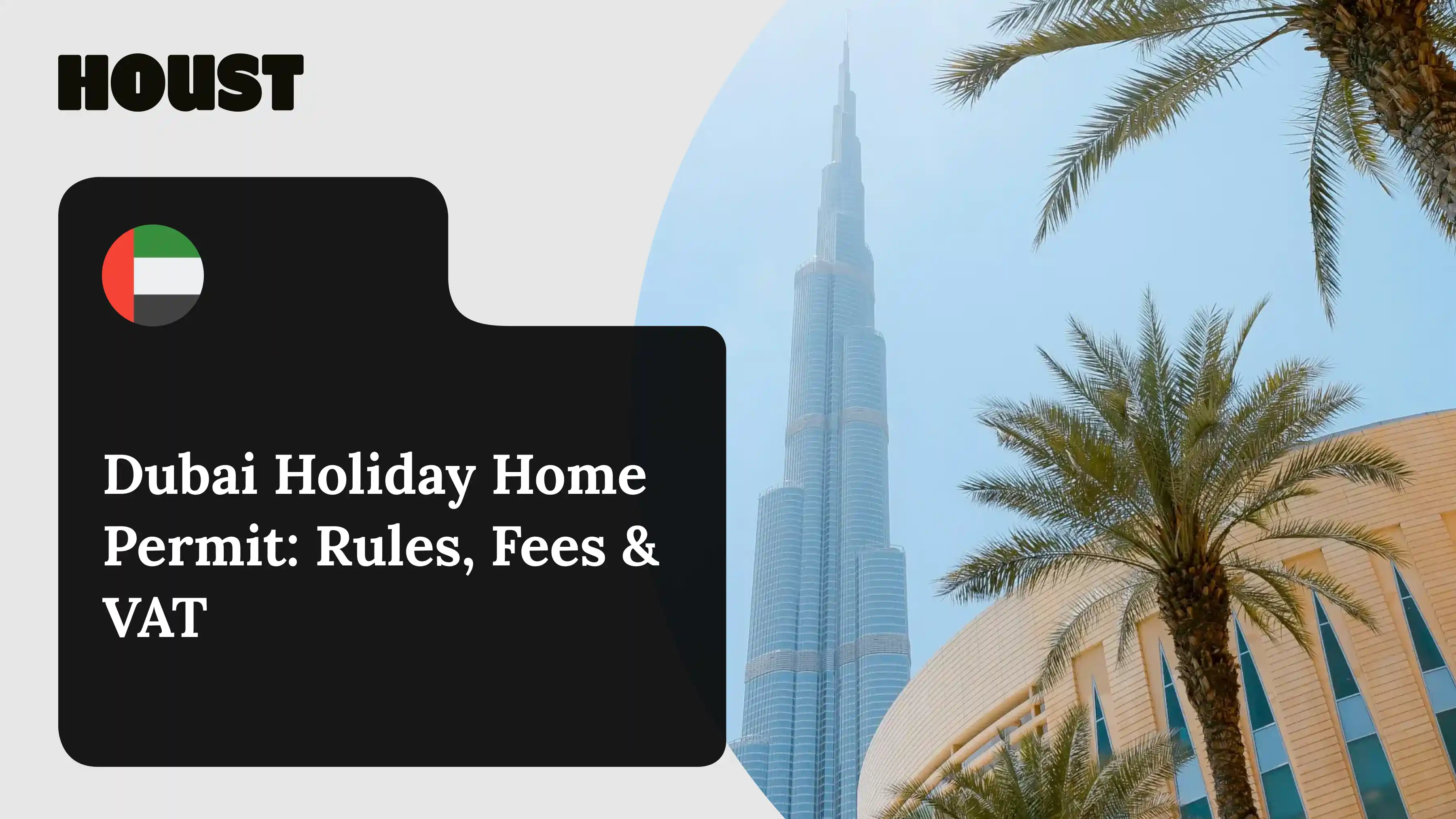TL;DR
Short-term letting is legal in Dubai as Holiday Homes if you follow DET rules. You must get a permit for each unit before listing, classify it (Standard or Deluxe), and collect Tourism Dirhamper occupied bedroom per night — AED 10 (Standard) or AED 15 (Deluxe) — then file by the 15th each month. VAT registration is mandatory once taxable turnover exceeds AED 375,000 in any 12 months (voluntary from AED 187,500).
Table of Contents
Is Airbnb legal in Dubai?
Yes — Dubai regulates STRs as “Holiday Homes.” The framework is set by Decree No. 41 of 2013 and its 2020 Implementing By-law, administered by the Department of Economy & Tourism (DET).
Permit first, then list. DET’s service page sets the steps: log into the Holiday Homes portal → add unit → upload supporting documents → review/submit → on approval, self-classify → pay fees. Every apartment or villa needs its own permit.
What permits you need (owner, tenant or operator)
- Who can apply: Owners and long-lease tenants (with landlord NOC), as well as licensed Holiday Home Operators, can apply via the HH system; building/strata NOCs may also be required. Permits are issued per unit.
- Classification: After approval, you self-classify the unit as Standard or Deluxe and must maintain the standard accordingly. hhpermits.det.gov.ae
Tourism Dirham: exact amounts, invoicing, and filing
- Amounts (Holiday Homes): AED 10 per night per occupied bedroom for Standard; AED 15 for Deluxe. Show it as a separate line on guest invoices.
- Deadline: Input/settle by the 15th of each month or late fees apply.
- Scope/logic: DET guidance treats the fee on a per room/bedroom per night basis (consistent across accommodation categories).
🚀 Build a Thriving Airbnb Business with Houst
Monetize short-term rentals without owning property. Our Airbnb Business Partnership Program helps you start, scale, and automate a profitable Airbnb business with smart pricing, automation, and expert support.
💡 No Property Needed
📈 Expert Growth Strategies
🤖 Automated Hosting Tools

⭐ Rated 4.8/5 by 2,500+ Hosts

🧼 Airbnb Cleaning & Turnovers, Done Right

⭐ Rated 4.8/5 by 2,500+ Hosts

Safety, quality & sustainability
DET expects baseline safety/quality (e.g., working alarms, extinguisher, clear egress info) and continued compliance with your declared classification. In 2025, DET published updated Sustainability Requirements for accommodation categories — align your energy/water/waste practices and retain records for checks.
Tip: Many buildings require an access/guest registration process. Secure the strata/building NOC before applying.
VAT (and what doesn’t apply)
- UAE VAT: Mandatory registration at AED 375,000 taxable turnover in the prior 12 months (or expected in the next 30 days); voluntary from AED 187,500. VAT rate 5% on taxable supplies. File with the Federal Tax Authority.
- Tourism Dirham ≠ VAT: The Dirham fee is separate and remitted to DET, not the FTA.
🚀 Build & Grow Your Airbnb Business with Houst
Turn your expertise into a profitable Airbnb business — without owning property.
Join Houst’s Airbnb Business Partnership Program to start, manage, and scale with ease. Get expert support, automation tools, and smart pricing strategies to maximize earnings and grow faster.

⭐ Rated 4.8/5 by 2,500+ Hosts


⭐ Rated 4.8/5 by 2,500+ Hosts

How to stay compliant (step-by-step)
- Check eligibility & building rules — Are you the owner or a tenant with landlord NOC? Obtain strata/building NOC if required.
- Create your DET account — Register/log in to the Holiday Homes portal.
- Add your unit & upload documents — Apply for the unit permit (one permit per unit), attaching deed/tenancy + NOC, ID, DEWA, and building NOC as applicable.
- Self-classify (Standard/Deluxe) — Ensure your amenities meet your chosen category.
- List only after approval — Do not advertise or accept bookings until your permit is issued.
- Invoice correctly & collect Tourism Dirham — AED 10/15 per occupied bedroom per night; file by the 15th monthly in the HH system.
- Maintain safety & sustainability — Keep safety kit serviced and align with DET Sustainability Requirements 2025.
- Monitor VAT — Register when turnover crosses AED 375,000 (or register voluntarily from AED 187,500).
Check with DET: Pages and fees update periodically; always cross-check the Apply and Operator service pages for the latest steps, rates and deadlines.
FAQs
1) Is there a 90-night cap in Dubai?
No. Dubai focuses on permits, classification and fees rather than a citywide night cap. A unit permit is required before listing.
2) What are the Tourism Dirham fees for Holiday Homes?
AED 10 (Standard) or AED 15 (Deluxe) per occupied bedroom per night, with returns due by the 15th to DET.
3) Can tenants apply, or only owners?
Tenants can apply with a landlord NOC (and building/strata approvals if required). Permits are per unit.
4) When do I need to register for VAT?
When taxable turnover exceeds AED 375,000 in any 12 months (or you expect to exceed it in the next 30 days). Voluntary from AED 187,500.
5) Who do I pay Tourism Dirham to — and how often?
To DET via the Holiday Homes system, with monthly returns due by the 15th.
Not Advice: This guide highlights key points for short-term letting and is not legal or tax advice. Rules change — always check the relevant authority’s website for your property and seek professional advice if unsure.
.webp)
.webp)
🚀 Start & Scale Your Airbnb Business with Houst
Join Houst’s Airbnb Business Partnership Program to start, manage, and grow your short-term rental business. With expert marketing, automation tools, and dynamic pricing strategies, we help you maximise earnings and scale faster.

⭐ Rated 4.8/5 by 2,500+ Hosts






